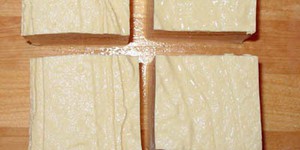Sixth Grade, Cooking & Food Science Science Projects (46 results)
Who doesn't love food? It's fun to make, it's fun to eat, it's fun to ...study? That's right! There is a lot of science that goes into the everyday foods that you love. Explore questions such as how baking ingredients work, how and why certain ingredients mix well together, and why people's tastes differ.
|
Select a resource
Sort by
|
When you think of successful inventions from the 1900's that have dramatically changed how people live, what comes to mind? The car? Radio? TV? The computer? What about the microwave oven? You might not remember a time when microwave ovens were not a standard part of most kitchens, but your parents or grandparents probably do. They can remember when heating leftovers took a good 30 minutes in a traditional oven. Or thawing a food from the freezer meant leaving it in the refrigerator overnight.…
Read more
Yogurt is a very versatile dairy product. It's yummy eaten straight from the container, it is good for your digestive system, and it can be used in several ways for cooking. There is historical evidence that yogurt-making developed 4,500 years ago! Humans depended on yogurt-making as a way to preserve milk. Yogurt is the result of bacterial fermentation of milk. In fermentation, the bacteria consume the milk sugar, lactose, and produce lactic acid. The end-product is a thick, creamy, and tangy…
Read more
Spicy fried tofu. It's a delicious and savory main dish at many Asian restaurants. Stab a golden-brown piece, bite into it, and the juice inside rushes out, filling your mouth with rich flavors. Continue eating and you find the texture is very chewy and meat-like. Did you ever wonder how those white blocks of tofu you see in grocery stores are transformed into the chewy little sponges packed with flavorful juices you see in Asian restaurants? Try this cooking and food science fair project to…
Read more
When you open a can of green beans, have you ever wondered why the beans are not mushy, or more like a puree? Canning requires boiling the beans for a long period of time to kill bacteria, so why don't the beans fall apart into small pieces? Some fruits and vegetables—like cherries, apples, potatoes, sweet potatoes, beets, carrots, beans, cauliflower, and tomatoes—have the ability to undergo hardening, or firming of their plant tissues. A special enzyme, called pectin methyl…
Read more
Peanut butter is a popular ingredient in sandwiches, cookies, and many other common foods. In this cooking and food science fair project, you will roast peanuts in the oven at 350 degrees for 20, 30, and 40 minutes to produce variable levels of color and flavor. Roasting not only adds complex flavors to the peanuts, but it also destroys enzymes that produce off-flavors.
Each lot of roasted peanuts will be used to make a batch of peanut butter. You will evaluate each batch of peanut butter for…
Read more
Brrrr, freezing cold! It's the worst nightmare of any fresh fruit or vegetable! If the produce in your kitchen had legs, they would run in a panic every time the freezer door opens. Why? Well, freezing temperatures are not kind to fresh produce. Freezing kills the plant tissues and alters them on both a chemical and physical level. Chemically, the enzymes in the produce become more concentrated and do not work normally, so that discoloration, off-flavors, vitamin breakdown, and toughness may…
Read more
|
Explore Our Science Videos
Aluminum Foil Boat Design - STEM Lesson Plan
Write and Read Braille – STEM activity
Build a Wind-Powered Car






